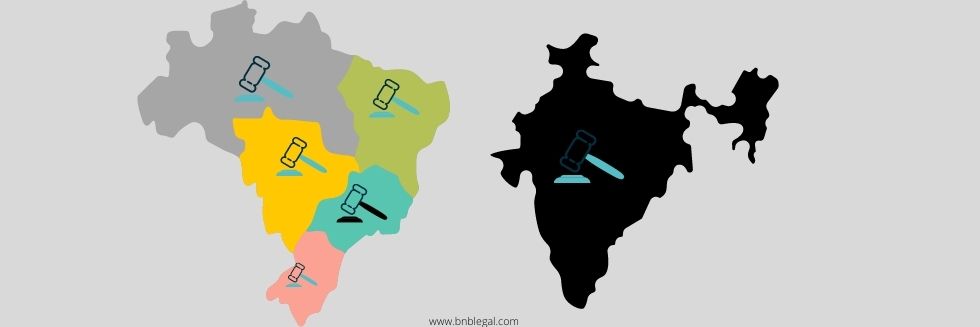Divorce is already an exhaustive process. But a parallel adjudication of parties’ matrimonial disputes in Courts simultaneously in India and abroad makes it more complex, not just for the husband and wife but for the courts too. This can create conflict among authorities of courts. Here comes the significance of an anti-suit injunction against foreign divorce proceedings. An anti-suit injunction order restrains a party from commencing or continuing a suit in a court.
What Is Meant By Anti-Suit Injunction?
Anti-suit injunction is a species of the injunction. An anti-suit injunction is a court order that prevents one of the parties to a lawsuit from pursuing its remedies in a foreign court. As an example, two entities, one in the United States and the other in India, are at odds.
One entity seeks redress in a forum in the United States that is neither natural nor convenient, and where the opposing party is not subject to its jurisdiction. The opposing party can simply approach the local courts and declare that all conflicts should be resolved by a single court, and can thus obtain an injunction to prevent the other party from pursuing remedies in a foreign jurisdiction.
The Apex Court in a recent Order in Madhavendra L.Bhatnagar v. BhavnaLall, [(2021) 2 SCC 775], held that an anti-suit injunction can be issued if the other party had already resorted to proceedings before another court including outside India.
What Is An Anti-Suit Relief?
An anti-anti-suit injunction is basically an injunction barring a court from continuing with a proceeding in the manner of an anti-suit injunction that is underway and/or where orders of anti-suit injunction have been issued.
The first such case in which an anti-anti-suit injunction was issued included disagreements between Lenovo and Motorola/IPCom over the enforcement of Fair Reasonable and Non Discriminatory (FRAND) requirements for the award of mobile patents. In this case, the US courts awarded Lenovo an anti-suit injunction, but the French courts granted Motorola/IPCom an anti-anti-suit injunction, stopping the US courts from moving further. Similar anti-anti-suit injunctions were issued by German and English courts.
Despite the fact that the legislation governing anti-anti-suit injunctions in India is still in its infancy, they have been issued by the Delhi High Court and the Calcutta High Court.
Anti-Suit Injunction In Matrimonial Disputes:
Shri Anil Malhotra and Ranjit Malhotra in the ‘Global Indians and The Law’ published by OakBridge referred to anti- suit injunction in Chapter 23 as follows:
“In this backdrop, this new dimension of matrimonial litigation is coming into practice in the arena in the shape of anti-suit injunctions. They are the remedy against filing of suits in different jurisdictions, in respect of the same cause of action. A petition preferred in India, for restraining an opposing spouse from pursuing or continuing with a complaint for matrimonial relief in a foreign Court, would be such an anti-suit injunction petition in matrimonial matters. Lack of jurisdiction, both regarding the corpus of the Hindu marriage, and the physical presence of an Indian spouse in the territory abroad, is the main ground of such Suits in India. However, even the reverse application now finds popular practice, making anti-suit injunctions a two-way street.”
The power of the Family Court to award injunctions in marriage disputes makes an anti-suit injunction viable. This authority may be traced back to Explanation (d) to Section 7(1) of the Family Courts Act. However, the Family Court must use extreme caution in granting the remedy.
Present Legal Scenario Concerning Anti-Suit Injunction In India
When Can Anti-Suit Injunction Be Granted? The anti-suit injunction order is granted only under certain circumstances because it may lead to conflict between the courts of different countries. Here are some landmark judgments related to anti-suit injunction in India which will help you understand those specific circumstances.
1. Modi Entertainment Network v. W.S.G. Cricket PTE. Ltd., (2003) 4 SCC 341:
In an anti-suit injunction has laid down the following principles:-
(1) In exercising discretion to grant an anti-suit injunction the court must be satisfied with the following aspects:
a) the defendant, against whom the injunction is sought, is amenable to the personal jurisdiction of the court;
b) if the injunction is declined, the ends of justice will be defeated and injustice will be perpetuated; and
c) the principle of comity- respect for the court in which the commencement or continuance of action/proceeding is sought to be restrained – must be borne in mind.
(2) in a case where more forums than one are available, the Court in exercise of its discretion to grant anti-suit injunction will examine as to which is the appropriate forum (forum conveniens) having regard to the convenience of the parties and may grant anti-suit injunction in regard to proceedings which are oppressive or vexatious or in a forum non-conveniens;
(3) Where jurisdiction of a court is invoked on the basis of jurisdiction clause in a contract, the recitals therein in regard to exclusive or non-exclusive jurisdiction of the court of choice of the parties are not determinative but are relevant factors and when a question arises as to the nature of jurisdiction agreed to between the parties the court has to decide the same on a true interpretation of the contract on the facts and in the circumstances of each case;
(4) a court of natural jurisdiction will not normally grant an anti-suit injunction against a defendant before it where parties have agreed to submit to the exclusive jurisdiction of a court including a foreign court, a forum of their choice in regard to the commencement or continuance of proceedings in the court of choice, save in an exceptional case for good and sufficient reasons, with a view to prevent injustice in circumstances such as which permit a contracting party to be relieved of the burden of the contract; or since the date of the contract the circumstances or subsequent events have made it impossible for the party seeking injunction to prosecute the case in the court of choice because the essence of the jurisdiction of the court does not exist or because of a vis major or force majeure and the like;
(5) where parties have agreed, under a non- exclusive jurisdiction clause, to approach a neutral foreign forum and be governed by the law applicable to it for the resolution of their disputes arising under the contract, ordinarily no anti- suit injunction will be granted in regard to proceedings in such a forum conveniens and favoured forum as it shall be presumed that the parties have thought over their convenience and all other relevant factors before submitting to non-exclusive jurisdiction of the court of their choice which cannot be treated just an alternative forum;
(6) a party to the contract containing jurisdiction clause cannot normally be prevented from approaching the court of choice of the parties as it would amount to aiding breach of the contract; yet when one of the parties to the jurisdiction clause approaches the court of choice in which exclusive or non- exclusive jurisdiction is created, the proceedings in that court cannot per se be treated as vexatious or oppressive nor can the court be said to be forum non-conveniens; and
(7) the burden of establishing that the forum of choice is a forum non-conveniens or the proceedings therein are oppressive or vexatious would be on the party so contending to aver and prove the same.
2. Dinesh Singh Thakur V. Sonal Thakur, CIVIL APPEAL NO. 3878 2018:
Brief Facts: Dinesh Singh Thakur, the appellant-husband, and Sonal Thakur, the respondent-wife, married on February 20, 1995, according to Hindu customs, and two children were born of the union. At the time of the marriage, the appellant-husband was working in the United States of America (USA), and he brought the respondent-wife to the USA on a Dependent Visa. In May of 2003, both parties were granted US citizenship. They were granted “PIO” (Person of India Origin) status in June 2003 and “OCI” (Overseas Citizens of India) status in July 2006.
The appellant-husband filed a plea at the Family Court, Gurgaon, under Sections 13 and 26 of the Hindu Marriage Act, 1955 (in short ‘the Act’) against the respondent-wife, which is undergoing adjudication by the Court. Following that, the respondent-wife filed a petition for divorce on the grounds of irretrievable breakdown of marriage and other reliefs in the Circuit Court of the Sixth Judicial Circuit in and for Pinellas County, Florida, USA, under Case No. 2016-008918-FD. Following that, the appellant-husband filed Civil Suit No. 15 of 2016 before the District Judge, Family Court, Gurgaon, under Section 7 of the Act, seeking a permanent injunction and declaration, among other things, to prevent the respondent-wife from pursuing the divorce petition before the Court in the United States.
The appellant-husband was granted an ex parte ad interim injunction by the learned District Judge in an order dated September 26, 2016. The respondent-wife, feeling aggrieved, filed an application for vacation and modification of the decision dated September 26, 2016. The injunction issued by the learned District Judge in his order dated 26.09.2016 was vacated by the learned District Judge in his order dated 18.10.2016. (d) Dissatisfied with the ruling removing the injunction, the appellant-husband filed CR No. 7190 of 2016 with the High Court. The petition filed by the appellant-husband was rejected by the learned single Judge of the High Court in a judgement dated 03.11.2016.
Judgement:
The Hon’ble Supreme Court,while considering whether the appellant-husband is entitled to an anti-suit injunction against the respondent-wife based on the facts and circumstances of the case, stated that anti-Suit Injunctions are intended to prevent a party to a suit/proceeding from filing or litigating a lawsuit in another court, especially a foreign court. Simply explained, an anti-suit injunction is a judicial order that prevents one party from bringing a case in another court that is not within its jurisdiction. The principles regulating the award of an injunction are similar to those determining the grant of an anti-suit injunction. The theory of equity governs the majority of injunction decisions.
“Still further, it considered that the expression Court’ in Section 41(b) of the Specific Relief Act, 1963 is used in its widest amplitude comprehending every forum where relief can be obtained in accordance with the law The Court also considered that there is near unanimous view that the Courts had no jurisdiction to grant interim injunction restraining a person from instituting any proceeding in a Court not subordinate to that from which injunction is sought. In view of the above, the Foreign Court cannot be treated as a Court subordinate to the Panchkula Court. Therefore, in terms of Section 41(a) & (b) of the Specific Relief Act, 1963, an injunction cannot be granted.”
3. George Koshy versus Sarah Koshy, (2021) 2 HLR 622:
Brief facts: An anti-suit injunction was filed to restrain the respondent from proceeding with the divorce petition filed by her in Australia. The marriage between the appellant and the respondent was solemnized at St. Ignatious Orthodox Church Kaipattoor.
Judgement:
When between the same parties, litigating on the same subject matter, and based on the same cause of action, only one Court has jurisdiction, it is said to have exclusive jurisdiction. However, if more Courts than one have jurisdiction over the same matter, they are called Courts of concurrent jurisdiction. In such circumstances, the criteria to determine which is the more appropriate jurisdiction for the adjudication of the matter, either party can elect to restrain the other party, not to proceed with the same litigation in the other non-preferred jurisdiction. In such process, Courts in different jurisdictions cannot restrain each other. However, the same parties appearing before both the Courts in different jurisdictions, can seek an injunction to restrain the other party, from proceeding in the other non- preferential jurisdiction with the same matter.
4. Vivek Rai Gupta v. Niyati Gupta,
Brief facts: The respondent’s spouse was the appellant in this case. Both the parties were from the state of Ohio in the United States. Some disagreements emerged between them, resulting in marriage conflict. It led to the respondent-wife instituting numerous processes against the appellant-husband in this case. The respondent-wife got a divorce decree from the US Court. Even the appellant-husband filed a divorce case against the respondent-wife in India, and a divorce judgement was obtained. As a result, the appellant-divorce husband’s from the respondent-wife has reached its conclusion.
The appellant-husband challenged the proceedings in the United States.
Fearing that the proceedings would be continued ex parte and that orders/decrees issued by the US Court would be detrimental to his interests, the appellant-husband filed a petition at the Family Court Bandra, Mumbai, seeking an anti-suit injunction. In the aforementioned case, he also filed an application for a temporary restraining order to prevent the respondent-wife from pursuing the divorce petition, in which the respondent-wife also requested support. The Family Court Bandra, Mumbai, denied the above mentioned plea on December 8, 2011, thereby denying the motion for an injunction prohibiting the respondent-wife from continuing the divorce suit. The appellant filed a Writ Petition at the High Court of Judicature in Bombay to appeal that ruling.
The respondent-wife pursued the case in the US Court, and the Court of Common Pleas, Cuyahoga County, Ohio, USA, issued a judgement and decree in her favour on September 18, 2012, giving her many reliefs, including divorce. Despite several orders issued by this Court instructing the respondent-wife to appear before the Court, she failed to do so, and the aforementioned order of 01.04.2015 was issued, directing all courts in this country not to execute the judgments issued by the foreign court.
Judgement:
“If the execution proceedings are filed by the respondent wife for executing the aforesaid decree passed by the US court against any other movable/immovable property in India it would be open to the appellant husband to resist the said execution petition on any grounds available to him in law taking the position that such a decree is not executable. At that stage, it shall also be permissible for the appellant husband to take a plea that the decree in question was passed by US court even after the injunction orders passed by the Supreme Court and, therefore, should not be executed. It will also be permissible for the respondent wife to plead that the decree passed is not in violation of any orders and it would be for the court where the execution petition is filed to decide such an issue in accordance with law.”
This article is written by Anjali Bisht. The author can be contacted via email at anjali@bnblegal.com.








